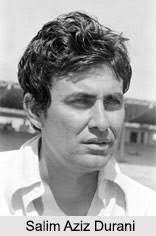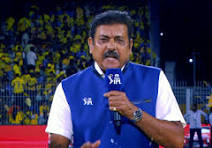Rajat Subhra Chatterjee
0055
A sad day for Indian Cricket as Salim Aziz Durrani, one of India’s most flamboyant cricketers died in the morning of 2nd April, 2023 at the age of 88.
What we see on a cricket field, at any given moment, are 11 fielders, two batsmen and a couple of umpires – and yet, the eyes of the crowd usually keep getting drawn to a few of those individuals, while gliding over the others. For those of my generation who came of cricketing age in the 1960s, a quartet of Indian cricketers – in rather different ways – embodied charisma: Farokh Engineer, Salim Durani, M L Jaisimha and Tiger Pataudi.
There was something about those guys – a combination of good looks, a way of carrying themselves, some intangible quality – that drew you. There were others who were better cricketers, by statistical or other measures, but this brief essay on Durani obviously brings about the different ways in which these four seem to have epitomised what was more than pleasing to watch rather than the game of cricket they played.
Salim Aziz Durani played in 29 Test matches from 1960 to 1973. An all-rounder, Durani was a slow left-arm orthodox spinner and a left-handed batsman famous for his six-hitting prowess. He is the only Indian Test cricketer to have been born in Afghanistan.
Durani debuted in Test on 1st January, 1960 at Brabourne Stadium against a star studied Australian side led by Richie Benaud that included the likes of Neil Harvey, Norman O’Neill, Alan Davidson, Ray Lindwal, Wally Grout. He scored 18 at no 8 and did not bowl in that drawn match when both Harvey and O’Neill scored hundred apiece in the first innings.
1961-62, Ted Dexter had brought MCC team to India when Tiger Pataudi debuted in the third Test at Delhi. The fourth and fifth Tests were at Kolkata and Chennai. In Kokata Test, Durani took 8 wickets to fashion India’s win. At Chennai, Durani again masterminded India’s victory by taking 10 wickets.
1964.
Pataudi won the toss at Eden Gardens against Simpson’s Australia and invited them to bat first. Simpson and Lawry opened and Australia was 94 without loss at lunch. The full Eden crowd by then was boiling against Pataudi firstly why he had opted for fielding having won the toss and secondly why was he persisting with Salim Durrani who was being hammered all the morning. Post lunch, none of us present that morning at the Eden thought Pataudi to resume again with Durrani.
The ground became a boiling pot, but to all of our dismay, Pataudi remained calm and started with Durrani from one end. The next episode was later narrated by Pataudi himself : “ During lunch break I had asked Salim that he would get another five overs to do something. If he had failed, it would be curtain for him.” Hugely excited Durrani got three wickets in four balls immediately post lunch session. Bill Lawry was bowled at 97/1. Then he removed in a flash batsmen like Bob Cowper, Peter Burge, Brain Booth, Tom Vievers and Barry Jarman. Durrani’s figures were : 6/73. Russi Surti got 3/ 38. Australia were all out for 174 in 85th over.
It has been a mystery that even after this, how and why Durani was ignored in subsequent series in 1967 in England, 1968 in Australia and again against Australia during India’s home series in 1969.-70 ? Well by that time Bapu Nadkarni was already in the team and later another left arm wizard Bishan Bedi came on the scene. Yet these could not have stopped Durani being included in the side. But Indian Cricket has always been such whimsical in its operational issues.
1971: India in the West Indies.
Gundappa Viswanath, the 21-year-old rising sensation in 1971, recollected a lovely anecdote in the book related to Salim Durani, who played a massive role in getting Clive Llyod and Sir Gary Sobers out in quick succession at the Port of Spain to pave the way for the victory. Viswanath in his inimitable style narrates the events at the team hotel on the third evening when West Indies were 150 for one in their second innings.
“We were having a drink in Ajit’s room at the end of the third day’s play when Salim Durani walked in,” recalled Viswanath in the book.
“He straightaway asked Ajit if he could have a drink; he loved his drink or two in the evenings and it was standard practice in the West Indies for all of us to assemble in Ajit’s room and unwind.”
“Just then he said, ‘I will get you Lloyd and Sobers tomorrow in two overs”. All of us were surprised and looked at him as he continued, ‘Just give me the ball when Lloyd is on strike and even if someone else picks up the non-striker at that point, don’t bother continuing with him and throw me the ball against Sobers,” remembered Vishwanath.
Next morning, Durrani got Llyod caught by Wadekar for 15 and then bowled Sobers through the gate for a duck as West Indies were all out for 261, leaving India with a target of 125. It was also Sunil Gavaskar’s debut Test in which he scored 65 and 67 not out.
His only Test century also came against West Indies at Port of Spain in 1962. Having batted at No 9 in India’s first innings of the fourth Test in Trinidad, he was promoted to No 3 for their second innings and scored 104. He also took all three West Indies wickets in the fourth innings even as the home team won by seven wickets.
In his last season during England tour in India in 1972-73, at Chepauk, Chennai, Durani scored 38 a piece in both the innings and took one wicket. But the lazy elegance came in to limelight when Chris Old lofted Chandrasekhar high , Durani was at least 30 yards away and he ran for it, held the stunner and somersaulted before completing the catch. It showed that when needed, even the flamboyance could come to effectiveness.
He appeared in the film Charitra with Parveen Babi in 1973. He was the first cricketer to win an Arjuna Award. He was awarded theC K Nayudu Lifetime Achievement Award by the BCCI in 2011.
The enchanted aura and charisma that surrounded, Durani, is very rare these days. “Lazy elegance” would pretty much summarise Salim Durani. The tall, well-built, light-eyed Pathan, looked bored most of the time. He seemed to have an inordinate amount of time to play his shots, and his languid three-step approach to the crease belied a bowler of immense guile and flight.
All grace, good looks and charisma, Farokh Engineer, Salim Durani, ML Jaisimha and Tiger Pataudi epitomized the charms of a bygone era.
RIP Durani.





